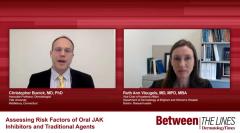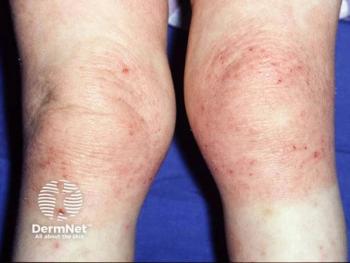
Experts Present Background on JAK Inhibitor vs Systemic Immunosuppressant Safety Study
Christopher Bunick, MD, PhD, introduces the objectives and design of a study comparing the safety of Janus Kinase (JAK) inhibitors and systemic immunosuppressants in the treatment of atopic dermatitis (AD).
Episodes in this series

Christopher Bunick, MD, PhD: We’re going to move on to another paper, which was published by myself looking at JAK [Janus kinase] inhibitor safety compared to traditional systemic immunosuppressive therapies. The goal of this analysis was to ask a simple question, just with all of the concerns that were initially around JAK inhibitor safety when they were first launched in AD [atopic dermatitis], [but] how did they fare compared to traditional systemic immunosuppressive, particularly the steroids, methotrexate, and cyclosporine? Because it used to be that 10 years ago if you use these traditional systemic immunosuppressives you were an advanced good doctor taking care of AD patients using these medicines. When we were doing our analysis, I give credit to Stefano Daniele, a medical student at Yale, who’s now matched at Harvard for residency. What we’re going to see is that in this data there was not a lot of AD-specific data for us to draw numbers from. We had to draw from what was out there to do our initial comparisons. In the design, we look at basically upadacitinib [Rinvoq] and abrocitinib [Cibinqo] both doses of the medicine for collecting adverse event incident rates and we did a literature search looking for incident rates of adverse events between the oral JAKs and the traditional systemic immunosuppressive therapies, focusing on malignancy, nonmelanoma skin cancer, major adverse cardiovascular events, [and] VTE [venous thromboembolism]. And as I mentioned, the major limitation of the study is that a lot of these events were just not documented in AD patients. I don’t think that we had a reason to understand them prior to a few years ago when the JAK inhibitors were starting to be in the clinical trials. But clearly, the next step is to understand these events in AD patients. So we can do a comparison of the traditional systemic immunosuppressives vs JAKs in AD patients only. But for now, this is the best comparison that we have.
TRANSCRIPT EDITED FOR CLARITY
Newsletter
Like what you’re reading? Subscribe to Dermatology Times for weekly updates on therapies, innovations, and real-world practice tips.




























